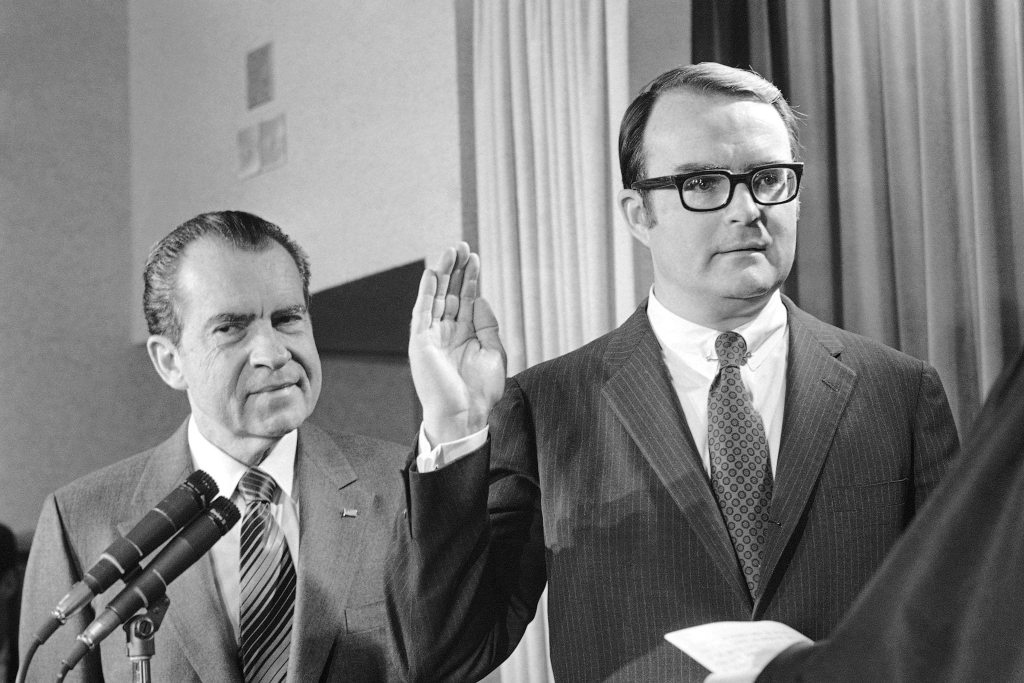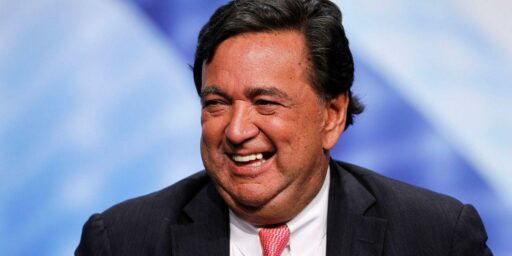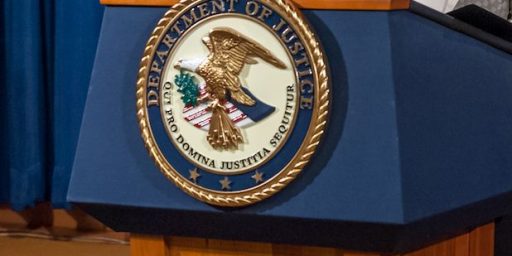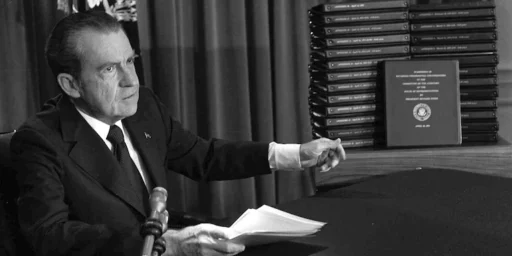William Ruckelshaus, Who Balked At ‘Saturday Night Massacre,” Dies at 87
A Justice Department official who had the courage to stand up to the President has died at the age of 87.

William Ruckelshaus, who served as former President Nixon’s Deputy Attorney General until one night in October 1973, has died at the age of 87:
William D. Ruckelshaus, a pragmatic and resolute government official who shaped the Environmental Protection Agency in the early 1970s as its first administrator and returned to the agency a decade later to restore its shattered morale after its watchdog powers had been muzzled, died Nov. 27 at his home in Medina, Wash. He was 87.
The death was confirmed by a daughter, Mary Ruckelshaus. She did not cite a specific cause.
In a long career in government and private industry, Mr. Ruckelshaus was widely promoted as “Mr. Clean” as much for his uprightness as for his role with the EPA. He cemented his reputation for unshakable integrity when, in 1973, as President Richard Nixon’s deputy attorney general, he defied a presidential order to fire the special prosecutor investigating the Watergate break-in.
Decades later, as chief executive of Houston-based Browning-Ferris Industries, the second-largest trash-disposal company in the country, he expanded the company’s presence into New York and worked with law enforcement agencies to help break mob control of the city’s trash removal business.
Mr. Ruckelshaus, the scion of a prominent Indianapolis legal family, was a moderate Republican educated at Princeton and Harvard who rose in the Nixon-era Justice Department before guiding the EPA at its birth in 1970.
Hulking, rawboned and bespectacled, Mr. Ruckelshaus shepherded several federal environmental entities into a robust regulatory agency and did as much as anyone to mold the EPA’s mission.
During his three-year tenure, he created policies that forced cities to adopt anti-pollution laws, held automakers to strict emissions standards and banned the harmful pesticide DDT.
J. Patrick Dobel, a University of Washington public affairs professor who has written about Mr. Ruckelshaus’s leadership abilities, said he focused the agency’s mission and drew early media attention to the EPA.
“He got the EPA a lot of public support and built up visibility,” Dobel said.
Around the time Mr. Ruckelshaus stepped down from the EPA in April 1973, the Nixon administration was foundering amid accusations that it had obstructed justice by covering up its involvement in the June 1972 break-in at the Democratic National Committee offices at the Watergate complex in Washington.
Mr. Ruckelshaus, who had no connection to the scandal, was made acting FBI director and then deputy attorney general in an effort by the Nixon administration to rebuild public confidence.
In 1973, Archibald Cox, a Harvard law professor appointed by Attorney General Elliot L. Richardson to investigate the break-in, had requested complete access to Oval Office tape recordings of the time immediately after the break-in. Nixon rebuffed the request and ordered Richardson to fire Cox on Oct. 20, 1973. Richardson refused and resigned.
Shortly afterward, Gen. Alexander Haig, Nixon’s chief of staff, phoned Mr. Ruckelshaus and instructed him to fire Cox.
“Your commander in chief has given you an order,” Haig said.
Mr. Ruckelshaus, who had promised the Senate during confirmation hearings that he would protect Cox, refused to carry out Nixon’s order and then resigned. The duties of the attorney general were transferred to Solicitor General Robert H. Bork, who agreed to fire Cox.
The event became known as the “Saturday Night Massacre” and precipitated the downfall of the Nixon presidency in August 1974.
Of his role, Mr. Ruckelshaus later said, “It was not a heroic act.”
After promising Cox the freedom to investigate the Watergate scandal, he said, “What I was requested to do was violate that promise.” The decision to quit, he said, was “very easy.”
Mr. Ruckelshaus was serving as vice president of legal affairs for Washington state-based timber giant Weyerhaeuser when President Ronald Reagan asked him to return as EPA administrator in 1983.
An earlier Reagan appointee, Colorado conservative Anne Gorsuch Burford (the mother of Supreme Court Justice Neil M. Gorsuch), had depleted the agency by asking Congress to cut the EPA budget, eliminating jobs, halting enforcement activities and spinning off many regulatory functions to the states.
Some of her senior staffers kept a list of career appointees deemed disloyal to Reagan and let the entire staff know of the list. During Burford’s tenure, Congress suspected the EPA was misspending hazardous waste cleanup funds and ordered that financial documents be turned over. Burford refused. She and 12 senior EPA officials were fired or resigned.
Reagan appointed Mr. Ruckelshaus to revive the demoralized agency. On his first on the job, agency officials unfurled a banner, “How do you spell relief? R-U-C-K-E-L-S-H-A-U-S,” a reference to a popular Rolaids commercial.
On his second day, he fired four people to make room for his own management team. Mr. Ruckelshaus set out to improve the agency’s image and, during his two years leading the EPA, received Reagan’s support and opened relations with Congress.
In 2008, Time magazine rated Mr. Ruckelshaus among the best Cabinet secretaries in U.S. history. (The EPA was given Cabinet-level status in 1990.)
During his first stint at the EPA, Ruckelshaus was instrumental in banning the pesticide DDT, which had been linked to widespread environmental damage:
One of Mr. Ruckelshaus’s most significant moves at the EPA was to ban the harmful pesticide DDT, University of Arizona professor J.E. “Ed” de Steiguer said in an interview.
The pesticide became a target of the environmental movement after biologist Rachel Carson called it the “elixir of death” in her influential 1962 book “Silent Spring.” Because DDT was virtually nondegradable, it was transferred through the food chain. It was particularly devastating to birds and contributed to the near extinction of the bald eagle, the national symbol of the United States. The bald eagle eventually rebounded and was taken off the endangered-species list in 2007.
While history will likely remember Ruckelshaus mostly for his role in Watergate and standing up to the President regarding the firing of Archibald Cox, his most important role was at the EPA in both his first and second stints at the position. In that role, he helped to shape the newly formed agency into what it has become today. The fact that he was appointed by Republican Presidents is a demonstration of the extent to which disdain for the environment, which has come to mark what we now know as conservatism and the Republican Party, have taken over the right.






Always a good name to remember when conversations about Bork come up. This guy had the integrity that Bork never had. Bork’s judicial views could have been extreme or common as dirt, but absent the integrity displayed by Ruckelshaus, Bork never deserved a seat on SCOTUS.
BTW, notice a common theme amongst GOP SCOTUS nominees. Bork was nominated as a reward for firing Cox. Kavanaugh was chosen for his role in trying to impeach Clinton. Gorsuch gets nominated as a way to pay back his mother for behaving like a true conservative and getting fired. Hundreds of judges and the GOP has to keep dredging up the same names.
Steve
Steve
Yes, children, there really was a time when at least some Republicans had integrity.
A summary of Ruckelshaus’s professional life should be required reading for every Rethug congress critter.
I worked at Weyerhauser as a summer intern, and then part time for the next year and summer before going off to grad school. I overlapped with Ruckelshaus. I was proud of him, and proud to be associated with him.
Despite disliking Nixon, I leaned Republican in those days, but not so much now. I’m not the one who has shifted, either.
@steve:
If Bork had not acted Cox would’ve been dismissed anyway and the DoJ would have been leaderless.
Both Richardson and Ruckelshaus later said that what Bord dd was the correct thing to do under the circumstances.
Doug- Or, when Bork threatened to resign also Nixon realizes he has gone too far. Of course they supported him afterwards, they are on the same team after all and it was what they had to say. However if we judge them by their actions, Bork is the one who stands out for not doing the right thing.
Steve
Cox was an employee of the Dept. Of Justice.
Ultimately, he worked for the President. He would have been dismissed in any case,
Suppose Nixon just had to keep going to find someone to fire him, and he couldn’t do it? After having 10-20 people resign, how does that look? Suppose Nixon gives up and fires Cox himself? How does that look? I think that either of those goes along way towards turning public opinion. I am just not buying the defense that says I committed the offense/crime because someone else was going to do it eventually anyway. We dont accept that for enlisted military. Why do we accept it for high priced lawyers?
Steve
@Doug Mataconis:
I think I see the problem. We keep saying Barr doesn’t work for the President, yet he works at the pleasure of the President. The system as designed works, so long as the president isn’t a criminal. But as soon as the president is a criminal and is able to fill these posts with people of loose ethical standards, and there is always a plethora of willing candidates available, we get a criminal mess aided and abetted by people more interested in their personal agendas then they are with protecting the constitution.
@OzarkHillbilly:
Cannot be repeated often enough in a country so anxious to follow and obey: you work for whoever pays you. Trump doesn’t pay federal employees: taxpayers do. Cox and Barr and every other federal employee works for me and for you. POTUS is just head of HR, he’s not the owner of the business.
If one were faced with a dilemma of doing a.) The right thing, and b.) The inevitable thing, some here choose b.
Fascinating.
“Why do we accept it for high priced lawyers?”
Because high-priced lawyers are part of the aristocracy that the founders intended to run the government. Duh!!